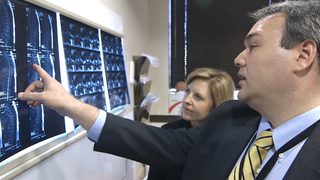Diagnosing Transverse Myelitis
Accurate diagnosis and timely treatment of TM is critical. UT Southwestern specialists are experts at differentiating potential mimics of TM, including spinal cord compression, arterial events of the spinal cord, and venous infarction of the spinal cord potentially caused by dural arteriovenous fistulas.
To diagnose TM, we collect information from a variety of tests and imaging studies to find evidence of damage to the spinal cord that is consistent with inflammation and not consistent with other causes.
We conduct a careful medical history, a neurologic exam, and a variety of tests that can include:
Treatment for Transverse Myelitis
UT Southwestern specialists provide individualized, multidisciplinary treatment plans to maximize each person’s abilities and minimize disabilities. A patient’s care team might include:
- Clinical nurses
- Neurologists
- Advanced practice providers (physician assistants and nurse practitioners)
- Neuro-ophthalmologists
- Neuropsychologists and psychiatrists
- Neuroradiologists
- Occupational therapists
- Physical therapists
- Rehabilitation specialists
- Social workers
- Registered dietitians
- Urologists
Acute therapy for TM includes high doses of corticosteroids and, in some patients, plasma exchange therapy. Other interventions are considered on an individual basis. Beyond the anti-inflammatory therapies for TM, rehabilitation is essential to recovery.
The goal of treatment is to ensure that all active inflammation is extinguished and then focus on recovery and symptom management. The UT Southwestern team also works to ensure that a complete workup for potential causes of TM has been completed. In addition to finding the best medicine for each individual, we also empower patients by treating symptoms of TM with medications, nutrition, exercises, and assistive devices.
Personalized treatment plans help patients sustain and improve functionality over the course of their illness, enable them to participate in more activities, and provide hope for their futures.
Support Services
The UT Southwestern Transverse Myelitis Program works closely with the Siegel Rare Neuroimmune Association (SRNA) to help people with TM and their families stay educated about new treatments and new research.
Siegel Rare Neuroimmune Association Support Group
SRNA sponsors a network of support groups around the nation and several in Texas. Visit the SRNA website for a listing of support groups and contact information.
Clinical Trials
We are leaders in research for transverse myelitis, helping to improve understanding and treatments for patients through clinical trials. Current clinical trials include:





